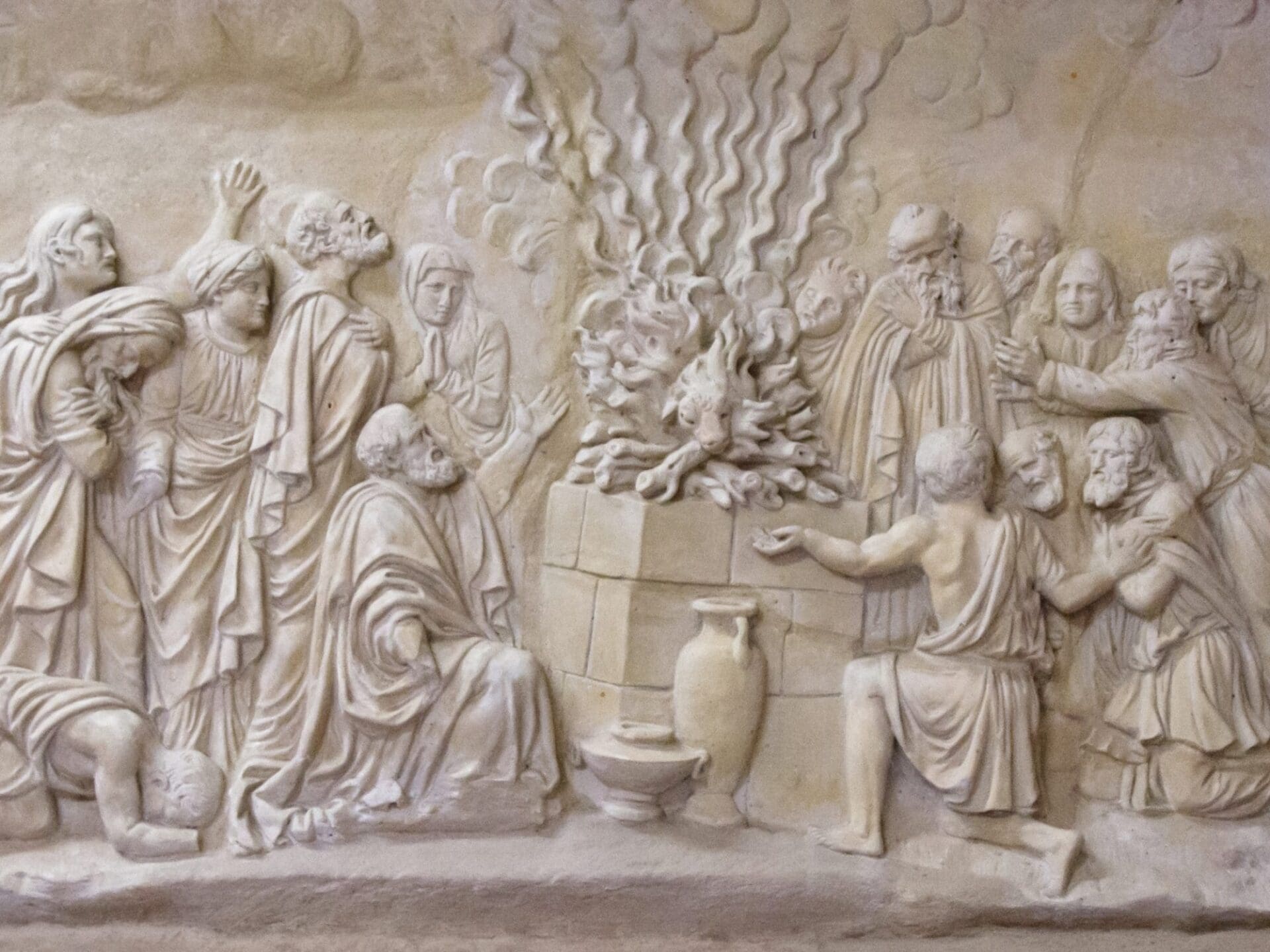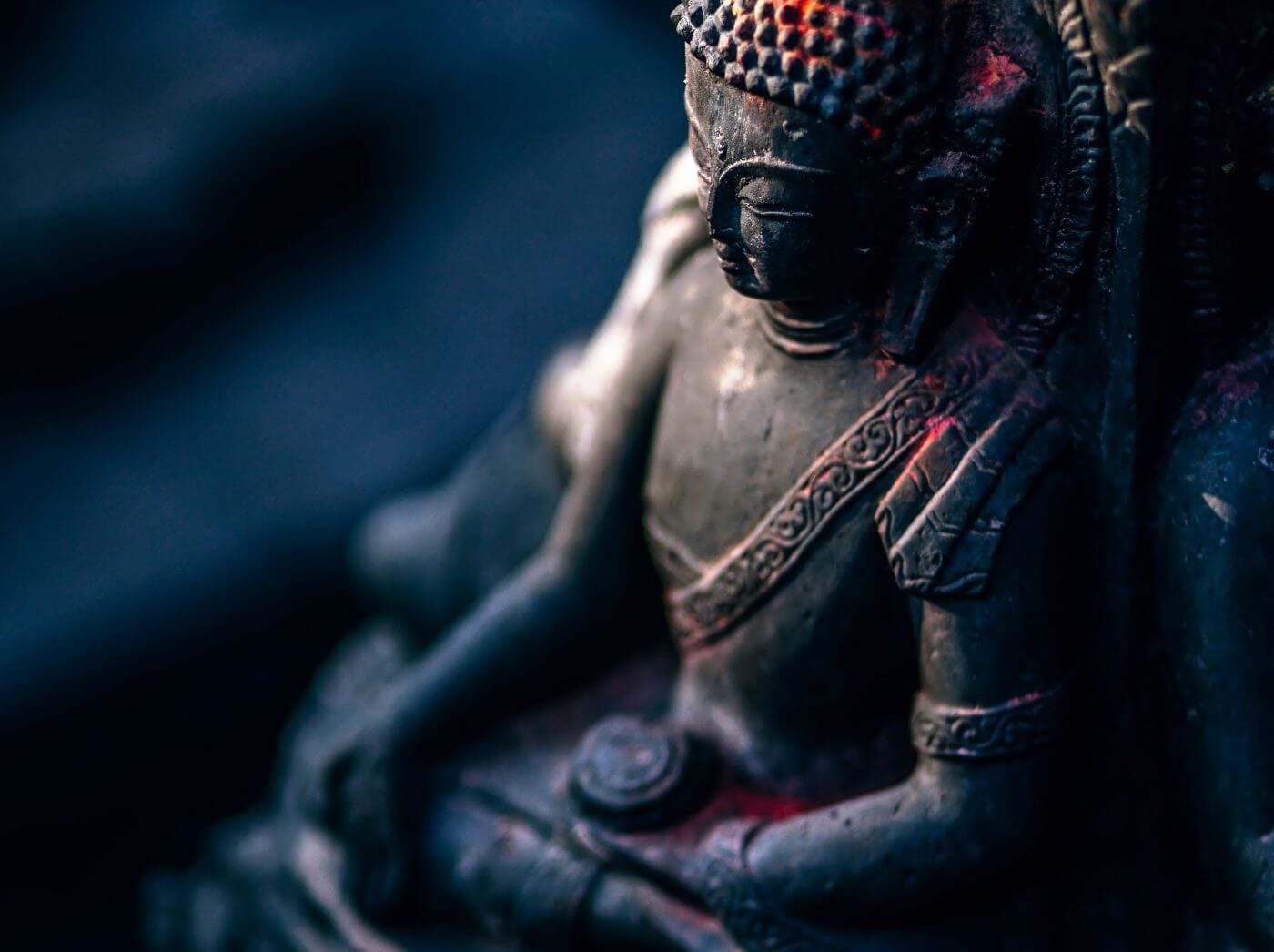
The Hike
Worship
1 Kings 18:20–46

King Solomon made a great contribution in building the temple, but he ended badly. In the years that followed, most of the kings after him turned away from the Lord. One of the worst was King Ahab who promoted the worship of idols. But God raised up the prophet Elijah to call His people back to Himself.
There is often a very short distance between triumph and disaster. When Solomon came to the throne, the people of God had everything going for them: wise leadership, strong unity, and peace in their land. God’s presence had come among them at the dedication of the temple. But as time passed Solomon’s success bred complacency, and the seeds of future disaster were sown in the later years of his reign.
A Recipe for Disaster
Solomon made three mistakes. First, he lost touch with hurting people. With the king’s attention focused on Jerusalem, the people in the south prospered, while their brothers in the north struggled under a program of forced labor that left them feeling increasingly marginalized.
Perhaps Solomon thought that the people in the north were less important, but his short-sighted leadership had long-term repercussions. And when he handed the country over to his son Rehoboam, the seeds of disunity were already planted.
Second, Solomon slid into self-indulgence. He had almost unlimited power and great resources, and so he could do virtually anything he wanted. In his early days, he threw his time, energy, and money into accomplishing something for the glory of God. But later in his life he used his position to indulge himself.
Solomon had 700 wives and 300 concubines (1 Kings 11:3), and this indulgence was the root of his downfall: “When Solomon was old his wives turned away his heart after other gods, and his heart was not wholly true to the LORD his God, as was the heart of David his father” (11:4).
Third, Solomon chose to do what was popular instead of what was right. Having married so many foreign wives, he succumbed to pressure to build altars to the gods they worshiped: “Solomon built a high place for Chemosh the abomination of Moab, and for Molech the abomination of the Ammonites, on the mountain east of Jerusalem. And so he did for all his foreign wives, who made offerings and sacrificed to their gods” (11:7–8).
This was the beginning of flagrant idolatry among the people of God. At the start of Solomon’s reign, Jerusalem was the place where the living God had put His name. But by the end, Jerusalem was filled with shrines to other gods. Any visitor to Jerusalem would draw the conclusion that the God of Israel was one among many.
Solomon did great things for God in the first half of his life, and then he reversed much of the good he had done through the indulgence of his later years. He received a kingdom from his father, David, that was united and at peace, but he handed his son a kingdom that would soon be divided and at war.
When Rehoboam took over, he faced rumbling discontent among the people in the north. They found a leader in Jeroboam, rallied around him, and crowned him as their king. So the ten tribes in the north separated from the line of David that God had promised to bless.
The Story in the North
Jeroboam was a shrewd leader of the ten northern tribes, and he understood the cohesive power of religion. He saw that if faithful people from the north kept going down to Jerusalem to worship in the temple, they would be reminded of the unity they shared with their brothers and sisters in the south.
So Jeroboam decided to establish his own centers of worship. He had two golden calves crafted, and he told the people: “You have gone up to Jerusalem long enough. Behold your gods, O Israel, who brought you up out of the land of Egypt” (1 Kings 12:28). These were the same words Aaron had used when he made the golden calf in the desert (Exodus 32:8).
Worse was to follow. Jeroboam handed the kingdom over to his son Nadab, who followed in the ways of his father until he was murdered by Baasha. He was followed by Elah, who was a drunkard and murderer. Then there was Zimri, who was guilty of treason and only lasted seven days, and then Omri, who “did more evil than all who were before him” (1 Kings 16:25). Finally there was Ahab, who surpassed Omri by doing “evil in the sight of the LORD, more than all who were before him” (16:30). Ahab married the infamous Jezebel who used the power of the palace to initiate a campaign of persecution in which the prophets of God were hunted and killed.
In the years after the death of Solomon, Israel had changed beyond recognition. At the beginning of Solomon’s reign, the king said, “There is one God.” By the time of Jeroboam, the official position was that “there are many gods.” And by the time of Ahab, it was unacceptable to say that there is one God, and those who did so were subject to violent persecution. So God sent the prophet Elijah to restore true worship among His people.
Authentic Worship Is a Response to Revealed Truth
Mount Carmel was the scene of a great confrontation. Ahab sent 450 prophets of Baal and 400 prophets of Asherah, together with people from across the country (1 Kings 18:19). When everyone was gathered, Elijah challenged the people with a question: “How long will you go limping between two different opinions? If the LORD is God, follow him; but if Baal, then follow him” (18:21). Elijah did not appeal to tradition; he appealed to the truth. The single reason for worshiping the Lord is that He is God.
Nobody has the right to say that you should be a Christian because your parents were Christians, or because Christianity is the dominant religion in your culture. Christianity stands or falls on the claim that it is true: “If the LORD is God, follow Him.”
Elijah’s question assumed categories of truth and error, and the people found it very difficult to think in these terms. They had been brought up with the idea that the God you worship is simply a personal choice, that faith is a private matter, and that every individual must find a way to worship that fits his or her own personality.
But before you can worship, you need to know who God is. Authentic worship is a response to revealed truth. Public worship should be built around the truth. We should sing the truth, read the truth, pray the truth, and preach the truth.
Authentic Worship Focuses on the Living God
Elijah wanted the people to know that there is only one living God, so he invited the prophets of Baal to prepare a sacrifice and then call on Baal to answer by sending fire. The prophets of Baal gave themselves to the challenge, and they called on their god: “Oh, Baal, answer us!” (18:26). They danced around the altar and worked themselves into a frenzy.
What started out so bright, colorful, and lively soon turned dark, and a more sinister element began to show. The prophets of Baal began to “cut themselves” (18:28), putting themselves through self-inflicted agonies before they were ready to admit defeat.
But after all this intense activity, “no one answered; no one paid attention” (18:29). The worship of Baal was nothing more than an exercise in self-expression. The prophets were talking to themselves, since no one else was listening.
Baal worship evolved because at some point in history people made up mythical stories about a god called Baal and wrote them down. Then other people made images of Baal and carved them out of wood. But there was nothing in the worship of Baal beyond what human minds had dreamed up and what human hands had made. The whole thing was a cultural creation, and for that reason, it had no power.
Many people today have concluded that Christianity evolved in precisely the same way as the worship of Baal. They assume that the Bible is also a book of ancient myths, and since they assume that it is a creation of human culture, they insist that it has no authority. If they were right in their assumption, they would be right in their conclusion. A religion created by one culture should not be imposed on another. A religion that was merely the choice of one generation should not be foisted on another. If all religions are human creations, then none of them can claim to be true.
Authentic Worship Focuses on an Acceptable Sacrifice
But Elijah knew that the living God was no cultural creation. He longed for the knowledge of the living God to be restored in the land, so he built an altar and poured water over it to drench the sacrifice.
Then Elijah prayed: “O LORD, God of Abraham, Isaac, and Israel, let it be known this day that you are God… Answer me, O LORD, answer me, that this people may know that you, O LORD, are God” (1 Kings 18:36–37).
“Then the fire of the LORD fell and consumed the burnt offering and the wood and the stones and the dust, and licked up the water that was in the trench” (18:38). Imagine the intensity of a fire that not only burned up the wood but even the stones and the dust! When the people saw the fire, they fell prostrate and cried, “The LORD, he is God; the LORD, he is God” (18:39).
Try to imagine yourself in the crowd. You have bought into the prevailing belief of your culture that one religion is essentially the same as another. But as you watch Elijah praying, the sky is filled with fire. Suddenly it is clear to you, Elijah has been speaking the truth. The Lord is God, and now the fire of His judgment is about to fall!
Think about this wonderful truth: the fire of God fell on the sacrifice, not on the people. This points us to the cross where the judgment of God was poured out not on the soldiers who crucified Jesus, or on the crowds who mocked Him, but on Jesus Himself, who became the sacrifice for us. Jesus absorbed the judgment that was due to sinners. It fell on Him so that it would not fall on us. God diverted the judgment away from us and onto Jesus, and in this way, He reconciled us to Himself.
Opened
Authentic worship is always a response to revealed truth. It is directed toward the living God, focused around the Lord Jesus Christ, and inspired by the Holy Spirit True worship will be fostered where God’s truth is proclaimed, where Jesus Christ is exalted, and where God’s people submit to the work of the Holy Spirit in their lives.
If you want to grow in your worship, open your Bible and soak your mind in what God says about Himself. The Holy Spirit will use the truth to stimulate worship in your heart.
1 Kings 18:20–46
The Prophets of Baal Defeated
20 So Ahab sent to all the people of Israel and gathered the prophets together at Mount Carmel. 21 And Elijah came near to all the people and said, “How long will you go limping between two different opinions? If the LORD is God, follow him; but if Baal, then follow him.” And the people did not answer him a word. 22 Then Elijah said to the people, “I, even I only, am left a prophet of the LORD, but Baal’s prophets are 450 men. 23 Let two bulls be given to us, and let them choose one bull for themselves and cut it in pieces and lay it on the wood, but put no fire to it. And I will prepare the other bull and lay it on the wood and put no fire to it. 24 And you call upon the name of your god, and I will call upon the name of the LORD, and the God who answers by fire, he is God.” And all the people answered, “It is well spoken.” 25 Then Elijah said to the prophets of Baal, “Choose for yourselves one bull and prepare it first, for you are many, and call upon the name of your god, but put no fire to it.” 26 And they took the bull that was given them, and they prepared it and called upon the name of Baal from morning until noon, saying, “O Baal, answer us!” But there was no voice, and no one answered. And they limped around the altar that they had made. 27 And at noon Elijah mocked them, saying, “Cry aloud, for he is a god. Either he is musing, or he is relieving himself, or he is on a journey, or perhaps he is asleep and must be awakened.” 28 And they cried aloud and cut themselves after their custom with swords and lances, until the blood gushed out upon them. 29 And as midday passed, they raved on until the time of the offering of the oblation, but there was no voice. No one answered; no one paid attention.
30 Then Elijah said to all the people, “Come near to me.” And all the people came near to him. And he repaired the altar of the LORD that had been thrown down. 31 Elijah took twelve stones, according to the number of the tribes of the sons of Jacob, to whom the word of the LORD came, saying, “Israel shall be your name,” 32 and with the stones he built an altar in the name of the LORD. And he made a trench about the altar, as great as would contain two seahs of seed. 33 And he put the wood in order and cut the bull in pieces and laid it on the wood. And he said, “Fill four jars with water and pour it on the burnt offering and on the wood.” 34 And he said, “Do it a second time.” And they did it a second time. And he said, “Do it a third time.” And they did it a third time. 35 And the water ran around the altar and filled the trench also with water.
36 And at the time of the offering of the oblation, Elijah the prophet came near and said, “O LORD, God of Abraham, Isaac, and Israel, let it be known this day that you are God in Israel, and that I am your servant, and that I have done all these things at your word. 37 Answer me, O LORD, answer me, that this people may know that you, O LORD, are God, and that you have turned their hearts back.” 38 Then the fire of the LORD fell and consumed the burnt offering and the wood and the stones and the dust, and licked up the water that was in the trench. 39 And when all the people saw it, they fell on their faces and said, “The LORD, he is God; the LORD, he is God.” 40 And Elijah said to them, “Seize the prophets of Baal; let not one of them escape.” And they seized them. And Elijah brought them down to the brook Kishon and slaughtered them there.
The Lord Sends Rain
41 And Elijah said to Ahab, “Go up, eat and drink, for there is a sound of the rushing of rain.” 42 So Ahab went up to eat and to drink. And Elijah went up to the top of Mount Carmel. And he bowed himself down on the earth and put his face between his knees. 43 And he said to his servant, “Go up now, look toward the sea.” And he went up and looked and said, “There is nothing.” And he said, “Go again,” seven times. 44 And at the seventh time he said, “Behold, a little cloud like a man’s hand is rising from the sea.” And he said, “Go up, say to Ahab, ‘Prepare your chariot and go down, lest the rain stop you.’” 45 And in a little while the heavens grew black with clouds and wind, and there was a great rain. And Ahab rode and went to Jezreel. 46 And the hand of the LORD was on Elijah, and he gathered up his garment and ran before Ahab to the entrance of Jezreel.
(ESV)
Use these questions to further engage with God's Word. Discuss them with another person or use them as personal reflection questions.
Take the First Step to Open Your Bible
Join 35,000+ people who get ‘Open Today’. Every Wednesday you’ll get resources designed to inspire, encourage, and challenge you in opening your Bible.
Spend 31 days in Psalm 23 with this new book from Pastor Colin Smith for your gift of any amount in April!


